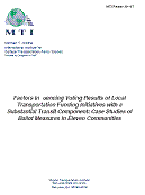- 408-924-7560
- mineta-institute@sjsu.edu
- Donate
Factors Influencing Voting Results of Local Transportation Funding Initiatives with a Substantial Rail Transit Component: Case Studies of Ballot in Eleven Communities
This publication is a follow-up study to MTI publication 00-01, Why Campaigns for Local Transportation Funding Initiatives Succeed or Fail: An Analysis of Four Communities and National Data. The earlier publication was case studies of four local ballot tax measures for transportation packages. The current study, Factors Influencing Voting Results of Local Transportation Funding Initiatives with a Substantial Rail Transit Component: Case Studies of Ballot Measures in Eleven communities, uses the same case study methodology as the prior study, and is expanded to 11 communities from the past four years. Some of the important conclusions identified by the study are as follows: 1) The combination of an energetic and credible opposition and a questionable reputation of the transit agency or transit system make it extremely difficult for a ballot measure to be successful; 2) When a community has no prior rail transit system, a comprehensive rail-only package is unlikely to be successful; 3)Without $1 million or more to spend on a combination of direct mail and television advertising it is difficult for proponents to be successful; 4) Developing a consensus transportation package depends on the specific details of the package and it is very difficult to generalize about the needed details; and 5) Under certain circumstances, voters do not appear to place significant importance on the existence or length of the expiration date of the tax used to fund the transportation package.
|
DR. RICHARD WERBEL Dr. Werbel has a good deal of consulting experience involving survey research. He has been primarily or solely responsible for six consulting projects using survey research. Each study used a complex and lengthy questionnaire and two involved the use of stratified sampling. One of these studies involved encouraging switching from solo driving to commuting. Although many faculty teach research and conduct survey research on a consulting basis, only a relatively small subset of this group ever conducts academic research dealing with research methodology. He has published two papers dealing with complicated methodological issues. Note: Dr. Werbel serves as Vice-Chair of IISTPS' Research Associates Policy Oversight Committee (RAPOC). |
-
Contact Us
San José State University One Washington Square, San Jose, CA 95192 Phone: 408-924-7560 Email: mineta-institute@sjsu.edu






